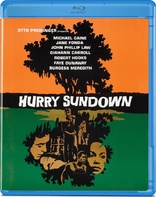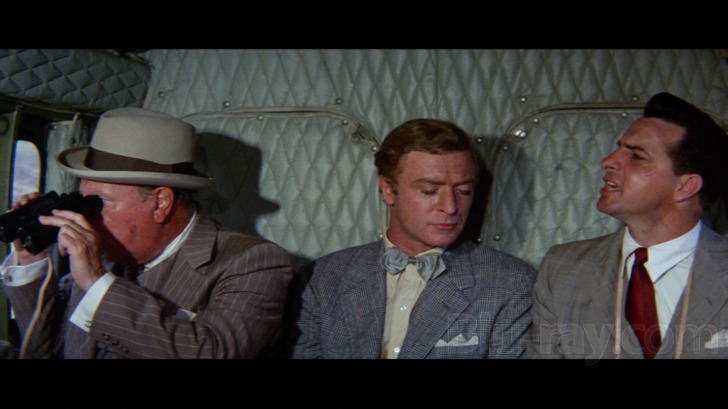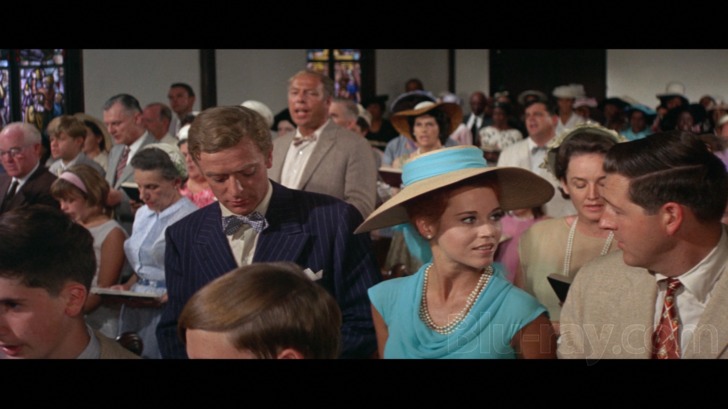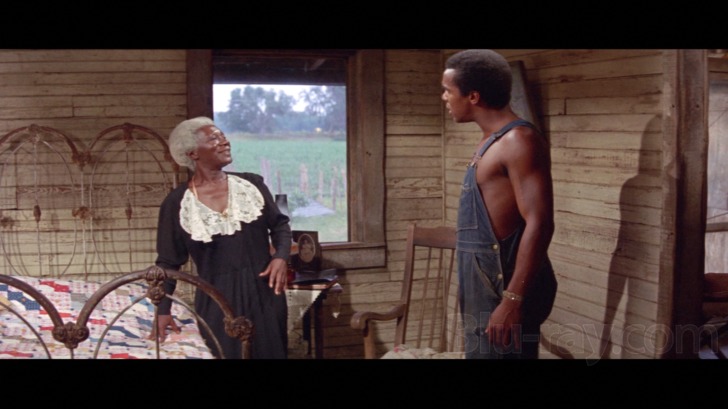Hurry Sundown Blu-ray Movie
HomeHurry Sundown Blu-ray Movie 
Olive Films | 1967 | 146 min | Rated PG-13 | Dec 23, 2014
Movie rating
6.3 | / 10 |
Blu-ray rating
| Users | 0.0 | |
| Reviewer | 2.5 | |
| Overall | 2.5 |
Overview
Hurry Sundown (1967)
A ruthless up and coming Southerner is determined to buy up the tracts of land that border his land - one owned by his cousin, the other by a black man.
Starring: Michael Caine, Jane Fonda, John Phillip Law, Diahann Carroll, Beah RichardsDirector: Otto Preminger
| Drama | 100% |
Specifications
Video
Video codec: MPEG-4 AVC
Video resolution: 1080p
Aspect ratio: 2.35:1
Original aspect ratio: 2.35:1
Audio
English: DTS-HD Master Audio Mono
Subtitles
None
Discs
25GB Blu-ray Disc
Single disc (1 BD)
Playback
Region A (B, C untested)
Review
Rating summary
| Movie | 2.0 | |
| Video | 4.0 | |
| Audio | 4.0 | |
| Extras | 0.0 | |
| Overall | 2.5 |
Hurry Sundown Blu-ray Movie Review
Reviewed by Jeffrey Kauffman October 25, 2012Note: This title is currently only available in this box set: The Otto Preminger Collection. Some aspects of this review refer to
all three films in this collection.
Otto Preminger loved pushing the envelope, and a number of his films, while seeming fairly passé today, were the
subject of major controversies when they were released. As incredible as it may sound, Preminger’s film version of
The Moon is Blue was the focus of a major cause célèbre due to its perceived sanguine approach toward
sex, something that will strike anyone seeing the film nowadays as positively weird. Preminger, ever the master
showman, played the controversy for all it was worth, releasing the film without the vaunted Breen office Seal of
Approval, and made the film into one of the blockbusters of the early fifties. Several more films in the fifties and sixties
caused various ruckuses. Carmen Jones featured a largely African American cast and once again toyed with
illicit seduction. A couple of years later Preminger caused headlines again when he tackled the subject of drug addiction
in The Man With the Golden Arm. 1959 saw the release of both Preminger’s film of Porgy and Bess, a
well meaning if flawed adaptation that has been tied up in rights issues with the Gershwin Estate (which hated the film)
and has rarely if ever been seen in the intervening years since its theatrical release, and what has become probably
Preminger’s most critically lauded film of this era, Anatomy of a Murder. That film created a sensation due to its then remarkably candid
discussions involving sex and rape.
While Preminger’s 1960 film of Leon Uris’ Exodus wasn’t as patently
controversial as some of his previous works, it continued Preminger’s tendency of being an agent provocateur,
at least behind the scenes, when the director started pounding the nails in the coffin of the blacklist by hiring Dalton
Trumbo under his own name to write the screenplay. Two years later Preminger offered Advise and Consent, a
film which wasn’t circumspect about portraying homosexuality in the highest levels of government. Sandwiched before,
after and in between this mere handful of films mentioned above are several other Preminger pieces, many of which are
undisputed classics in their own right (Laura) or at least highly regarded if acknowledged as being somewhat
flawed (The Cardinal). But the sixties saw a perhaps predictable decline in Preminger’s directorial fortunes, and
few would accord his later films the same accolades that were regularly bestowed on his earlier works. That said,
there’s virtually no Preminger film that doesn’t have something to recommend it, even if that something is
nothing other than camp value. The three films in this new box set may well be in that category, but they each also are
distinctive in at least a couple of other elements as well, not the least of which is the window they offer into Preminger’s
late sixties and early seventies mindset.

Hurry, Sundown
Film: 2.0 stars
Video: 4.0 stars
Audio: 4.0 stars
Camp Value: 4.0 stars
Preminger evidently optioned the novel of Hurry, Sundown before it was ever published, expecting it to be some sort of latter day Gone With the Wind. He couldn’t have been more wrong. The film, which is basically a convoluted tale of land rights woven around several family stories, both black and white, is just a patently odd combination of melodrama and outright camp. How else to properly explain Michael Caine as a greedy southern investor (and amateur saxophone player, no less) married to a coquettish Jane Fonda, whose “mammy” (the incredible Beah Richards) owns some land that Caine’s character needs to get a hold of. There’s another parcel at stake owned by John Phillip Law and his wife, hard working mother of four Faye Dunaway (in one of her first starring roles). Also on hand are Robert Hooks as Richards’ grandson, Diahann Carroll as a local teacher and Hooks’ kind of love interest, and Frank Converse as Fonda’s cousin, a newly consecrated Priest who has the temerity to serve communion to the town’s blacks right alongside the whites, angering the local judge (Burgess Meredith). (Interestingly, Hooks and Converse would go right into co-starring roles on N.Y.P.D., a great old cop show which was a brief but substantial hit for ABC in the late sixties).
The film is obviously a well intentioned attempt to illumine the horrible discrimination that blacks suffered at the hands of bigoted whites, but placing the film in the immediate post-World War II era distances it from what could have been its own era’s (1967) obviously visceral dealings with race relations. There are a number of just downright weird moments in this film, none more so than when Caine and Fonda’s afflicted child (described by Dunaway in a semi- hilarious scene as “peculiar”) just starts screaming, apparently for no reason (something that happens repeatedly throughout the film).
Hurry, Sundown made headlines of its own during production, but not for any substantial reasons. The cast evidently was near mutiny due to Preminger’s autocratic ways (Dunaway later sued to be let out of a five film deal she had signed with the director, something that evidently cost her a small fortune to settle, but which she more or less happily paid in order to never have to work with him again). Preminger also had some unavoidable issues of his own to deal with, including local Georgia racism (which to his credit, he stood up against) and a late in the shoot replacement of his cinematographer due to an injury. There's some especially haphazard editing on display throughout this outing, something that's really quite odd for a Preminger film, with some scenes just coming to an abrupt halt almost in mid- sentence as if either the director or editor wanted to get away from something really ridiculous happening. Easy listening maestro Hugo Montenegro contributes one of his very few film scores to the project, working a kind of quasi-Copland territory that is too contemporary sounding for the movie's supposed forties setting. The film can therefore only be charitably described as something of a mess.
Hurry Sundown Blu-ray Movie, Video Quality 

All three of the films are delivered via AVC encoded 1080p transfers. Hurry, Sundown and Skidoo offer a 2.35:1 aspect ratio, while Such Good Friends is presented in 1.78:1. Both Hurry, Sundown and Skidoo look very sharp and naturally filmic, for the most part, while rather strangely Such Good Friends, the most recent of the three films, is far softer and less robustly saturated than the first two. Both Hurry, Sundown and Such Good Friends have some really weird anomalies, where brief sequences seem to have been culled from a second generation (at least) element. In these sequences, things suddenly get much softer and less detailed and color is also nowhere near as saturated as the bulk of the films (see the screencap of Caine and Law in the car for a great example of this phenomenon, something that also happens late in Such Good Friends in a scene featuring Elaine Joyce in an apartment). All three films boast elements in very good to excellent shape, within certain limitations.
Hurry Sundown Blu-ray Movie, Audio Quality 

All three of the films feature lossless DTS-HD Master Audio Mono tracks that more than adequately recreate the rather modest sonic charms of these outings. Dialogue is very cleanly presented in all three of these films, and the music (which includes some sung elements in all three films, most notably in Hurry, Sundown and Skidoo) sounds just fine. Fidelity is very strong in all three of these tracks, though dynamic range is somewhat limited. Hurry, Sundown does have several boisterous explosions dotting its sonic landscape and Skidoo is so relentlessly frenetic it may give the impression of having dynamic range, but it's just an auditory hallucination.
Hurry Sundown Blu-ray Movie, Special Features and Extras 

No supplements of any kind are included on any of the three discs in this package.
Hurry Sundown Blu-ray Movie, Overall Score and Recommendation 

There's no denying that these three films are not exactly prime Preminger, but that doesn't mean they're worthless. Preminger's quality was frankly pretty spotty overall after his Anatomy of a Murder high, but there are glimmers of the director's innate brilliance, as well as his very pointed social justice attitudes, in all three of these films. The best of these is probably Such Good Friends, though those with an outré sense of the bizarre may well place Skidoo at the top of this particular pile for reasons only tangentially related to the film's actual instrinsic quality. I can't outright recommend this package on objective quality criteria, but I will say for certain fans, this collection is absolutely indispensable.
Similar titles
Similar titles you might also like
(Still not reliable for this title)

Her Smell
2018

Zoot Suit
1981

The Damned
La caduta degli dei
1969

To Kill a Mockingbird 4K
60th Anniversary Edition
1962

Men of Honor
2000

A Face in the Crowd
1957

Good
2008

All the King's Men
2006

Boss: Season Two
2012

Wild River
Fox Studio Classics
1960

Bad Lieutenant 4K
1992

Beyond a Reasonable Doubt
2009

12 Angry Men
1957

Nightmare Alley
1947

Billy Jack
1971

Show Me a Hero
2015

Serena
2014

The Cincinnati Kid
1965

The Fugitive Kind
1960

And Justice for All
...And Justice for All
1979